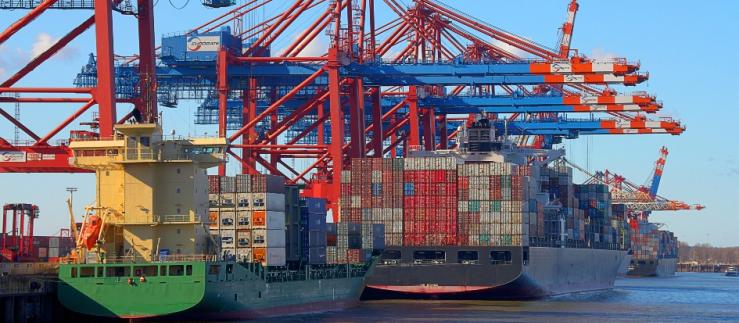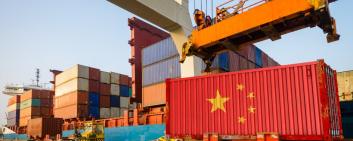Mr. Etter, one of Switzerland’s newest free trade agreements is with China. It has been in force since 1/7/2014. What are your conclusions about it today?
My conclusions are positive. The agreement is being used extensively by exporters and importers in both directions. Statistics show that bilateral trade flows have achieved above-average development in both directions. For China, the free trade agreement with Switzerland is a new experience, as it is China’s first free trade agreement with a western European country, which as a landlocked country also handles most of its exports via third countries. Thanks to the well-functioning cooperation with the Chinese authorities, in particular between the customs administrations of Switzerland and China, various simplifications have already been made to import processing on both sides.
Can Switzerland negotiate on equal terms at all with an economic power such as China?
That must be the basic requirement of any negotiation. If Switzerland were treated differently, we would not be able to negotiate successfully. Other countries may have larger economies, but that also means that more companies can use the agreement on their end. We also should not forget that in terms of value creation, Switzerland is one of the 20 largest economies in the world.
How difficult is it for Switzerland to assert its own needs?
When two countries negotiate an agreement, they are both pursuing the goal of facilitating trade. The challenge is that there are also less competitive sectors in each country that want to avoid additional import competition as much as possible. It is the task of the negotiating delegations to flesh out an agreement in such a way that the tariff reductions and other forms of trade facilitation result in a win-win situation. In any case, an agreement will only be concluded if it has advantages for both sides.
Have negotiations ever threatened to fail?
Any negotiation can fail. But it is quite rare for negotiations to be broken off. If negotiations don’t advance, it may mean that the time has yet to come. Then, in-depth clarifications are needed and the agreement is revisited at a later date. However, negotiations sometimes have to be suspended for political reasons. EFTA, for example, did not continue negotiations with Thailand after the military coup because there were no stable conditions on the other side.
Various agreements are currently under negotiation. Which ones might be concluded soon?
There are no guarantees until an agreement is actually concluded. Typically, the more difficult topics of a negotiation are not discussed until the final phase of a solution, which means that there may be further delays shortly before an expected conclusion. Specifically, it is expected that the negotiations with Ecuador may be completed in the near future.
Criticism of free trade agreements comes from agriculture, for example. The farmers want to keep this market closed. Can you make any sense of that?
Agriculture is supported by direct subsidies in Switzerland, and the price level of many Swiss agricultural products is kept high by import duties. Free trade agreements are needed so that Swiss industrial products and services do not fall behind on the export markets. However, agreements can only be concluded if a balance of interests between the negotiating parties succeeds. This means that the export interests of our negotiating partners must also be taken into account.
In the previous free trade agreements, comparatively limited improvements in access to the Swiss agricultural market were sufficient. In ongoing negotiations, such as with Mercosur or Indonesia, whose main export interests are agricultural products, new solutions will be needed. However, more open markets also offer opportunities for Swiss agriculture. This has been demonstrated by the free trade in cheese between Switzerland and the EU, for instance.
Critics also say that the application of agreements is too bureaucratic.
The use of a free trade agreement always involves certain additional expenses. To benefit from the tariff reductions, companies have to prove that their products fall under the agreement. The condition for this is that a product has been manufactured in the exporting country or has been processed there to a sufficient extent. In addition, Switzerland is a landlocked country. Certain overseas partner countries require additional evidence that a product has actually been exported from Switzerland, even if it has been stored in a seaport, such as Rotterdam, and shipped from there. The associated expenses decrease as a company gains experience and usually become less significant.
We should also remember that export products, even though they benefit from tariff reductions under a free trade agreement, still have to comply with the product regulations of the country of destination and may be subject to related controls and conformity checks. The removal of such trade barriers requires the harmonization of product legislation and the mutual recognition of market surveillance, as is the case between Switzerland and the EU thanks to the bilateral treaties based on common European standards in different sectors.
Do SMEs and large companies benefit equally from free trade agreements?
Generally, yes, even if the use of an agreement pays off more, the more often a company exports to a certain country. But that does not necessarily depend on the size of the company. There are many SMEs that use free trade agreements on a regular basis. The globalization of value chains also affects many SMEs, which means that they – as well as large companies – can improve their competitive standing by using free trade agreements. It may be useful to seek advice. Switzerland Global Enterprise offers support.
About Christian Etter
Ambassador Christian Etter is the Delegate of the Federal Council for Trade Agreements. Since 2006, he has headed the Foreign Trade Services Division of the Foreign Trade Directorate of the State Secretariat for Economic Affairs SECO. He previously served as Head of EFTA/Free Trade Agreements at SECO. From 1996 to 2000, Christian Etter headed the Department for Economic, Financial and Trade Matters at the Swiss embassy in Washington, D.C.






